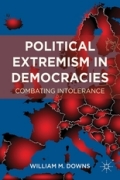
How do democracies resolve the paradox of having to tolerate the intolerant in their midst? Specifically, when political "extremists" - organized into parties that compete openly and successfully in democratic elections - enter the conventional institutional arena, how do mainstream actors react? Established democracies founded on principles of free voice and open competition typically struggle with how best to cope with pariah parties that ostensibly play by therules of the democratic game but then espouse exclusive and rejectionist positions. Cross-national evidence demonstrates significant variation in responsesto pariah parties, from outright bans to calculated disregard. The results ofthose actions appear to likewise vary in dramatic ways. While considerable research has been published looking at the historical, sociological, and economic conditions that help explain the resurgence and persistence of party-based extremism (especially the far-right variant) in western democracies, we presently know remarkably little about the relationship between democracy and effortsto combat extremism. This book deals with understanding how democracies respond to party-based extremism and with what consequences. INDICE: Pariahs in their Midst: Organized Extremism and the Problem of Tolerance in Contemporary Democracies .Ignore, Isolate, Co-Opt, Collaborate or Ban? Mapping Strategic Responses to Pariah Parties .Determinants of Democratic Defensiveness .Is the Cordon Sanitaire Effective? .The Moderating Effects of Incumbency? .Responding to Political Extremism Without Succumbing to It .Ban theBans, but Guard the Threshold? 'Lessons' from Old to New Democracies
- ISBN: 978-0-230-34079-4
- Editorial: Palgrave Macmillan
- Encuadernacion: Cartoné
- Páginas: 254
- Fecha Publicación: 08/06/2012
- Nº Volúmenes: 1
- Idioma: Desconocido
